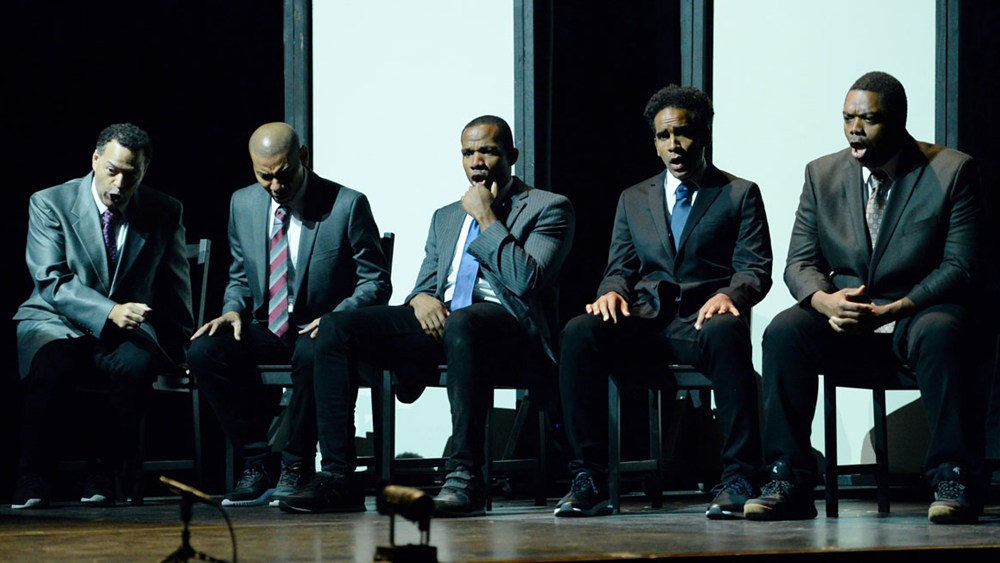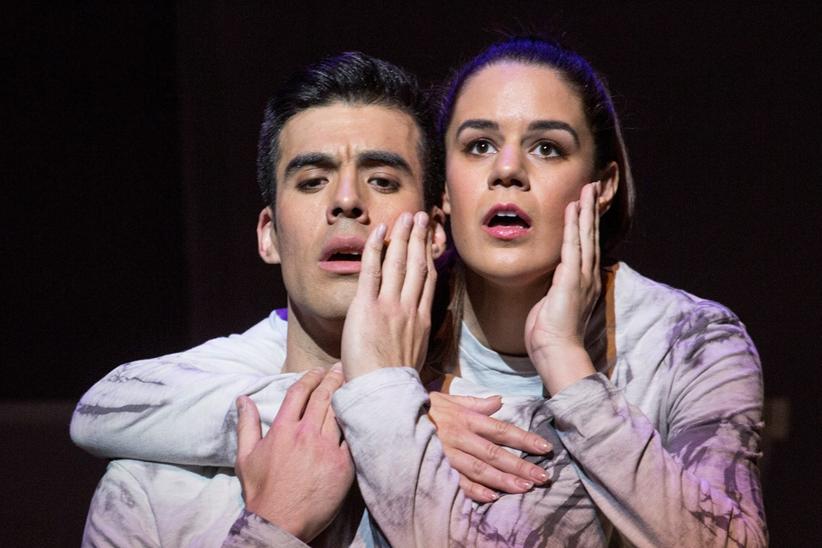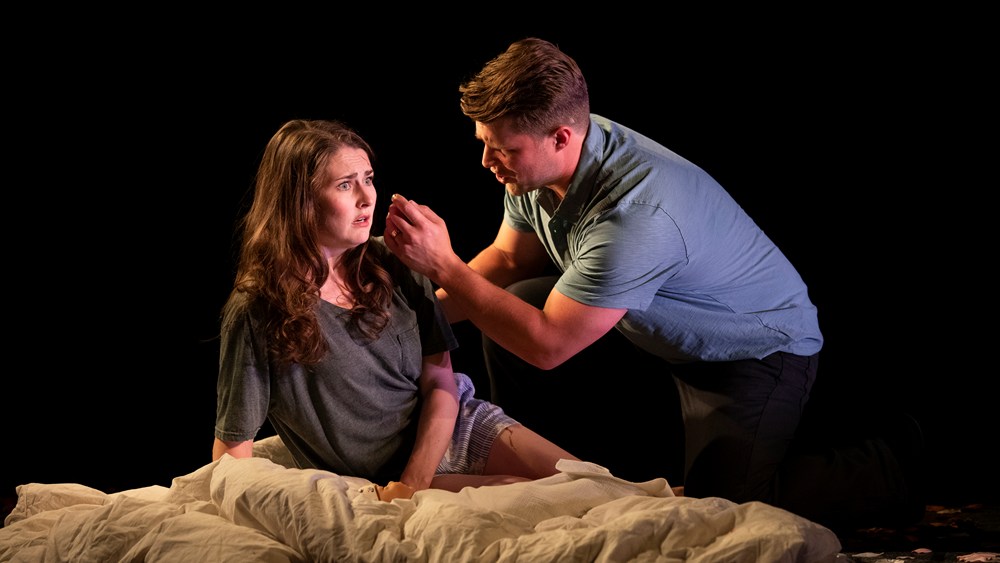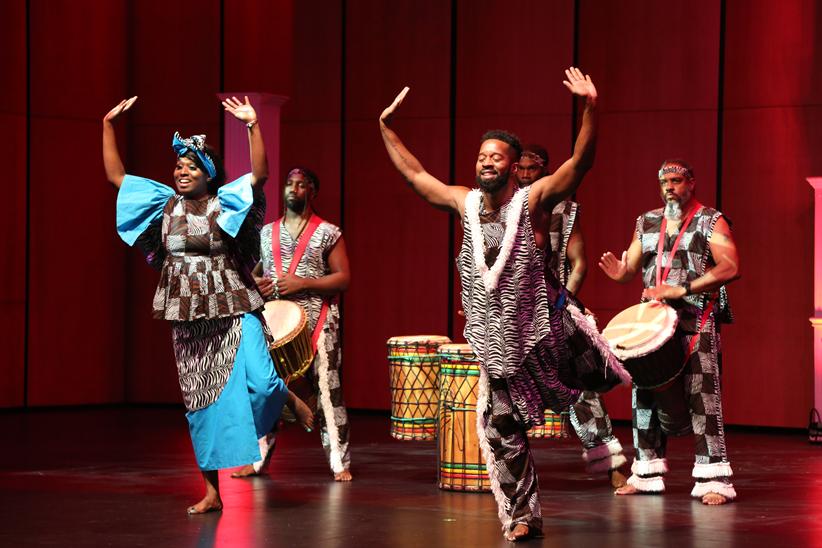Civic Players
Cultural institutions returning to live, in-person performance after the enforced hiatus of the pandemic are confronting questions that go beyond when, how, and if they will return to business as usual. An unprecedented infusion of government funds, intended to ameliorate some of the financial damage wreaked by the pandemic, has put a new spotlight on the obligations of such institutions to serve as true community resources. At the same time, the national reckoning over racial justice set off by the murder of George Floyd in 2020 has intensified the need for arts institutions to consider their response and relevance to today’s issues. Public statements of support and allyship were a start but, as Torrie Allen, president and CEO of Arts Midwest noted during the OPERA America conference panel, “The Politics of Art,” “Performative gestures are meaningless” without actual work on change.
Opera companies, with their reliance on legacy repertoire and their predominantly White, privileged core audiences, boards, and staffs, have long found it more comfortable to avoid “politics” both onstage and within their walls, but that has begun to change. “Some topics — like racial justice, violence against women, prejudice around sexual identity, mistreatment of veterans, inequities in public education — must be engaged,” says Marc A. Scorca, OPERA America’s president and CEO. “These aren’t political, but moral and ethical. A lot of taxpayer money is coming into our opera companies now, not simply to make the world more comfortable for opera lovers but so that our companies give us hope and a sense of unity after the pandemic. If anything, it’s more necessary than ever to have the discussion about how to serve our communities.”
For some companies, the process of engaging with contemporary topics has felt natural. In 2019, Long Beach Opera presented the world premiere of Anthony Davis and Richard Wesley’ The Central Park Five, a ripped-from-the-headlines piece about the five Black and Latino teens who were wrongly convicted of the 1989 rape and beating of a white jogger in New York’s Central Park and exonerated years later. Donald Trump, who at the time had publicly called for the teens’ conviction and execution, is a character in the opera; in 2019, and during LBO’s development process, he was president of the United States. Jennifer Rivera, who became general director of the company in 2017, notes that her “progressive opera company in liberal California” was the only one to pick up the project. “There was some worry about doing something so politically charged, concern that people might be offended, from maybe 10 percent of the staff,” Rivera says. Although LBO’s marketing department had some trepidation, Rivera describes her board as “game.” “My go-to when talking point to the board is ‘We tell human stories through music. If they are told in a way that is effective and evocative, they move people. If the subject matter holds political weight, that should not prevent it from being done.’”

The effort paid off: The opera won the Pulitzer Prize for Music and the related series of five Community Conversations on themes of race, equity, and justice helped the company build important new alliances. Those events were put together by Derrell Acon (who also sang the role of Antron McCray, one of the teens), working in collaboration with a community advisory committee. The committee remains strongly connected to the company; Acon was named the company’s associate artistic director and chief impact officer in June 2021.
While Rivera didn’t have to convince her board to do the piece, she says that a pragmatic approach could aid those who face that challenge. “If we have no current social relevance, stereotypes about opera will persist and most people will think that it is not for them,” she says. “Diversification of the audience is essential to the survival of the art form.” Data, she says, can be a powerful persuader: a discount coupon for performance tickets that was offered to Community Conversations attendees was enormously successful. “You can tell people it’s important until you are blue in the face; you’ll convince them with data that shows it’s financially valuable.” Long Beach Opera is mounting The Central Park Five again this season, this time with an all-Black creative team.
Reed Smith, general director of Anchorage Opera, had a somewhat trickier time with his board over the company’s production of Laura Kaminsky’s As One in 2018. The opera, which presents the journey of a transgender protagonist, was being mounted at the same time as Anchorage citizens were considering a “bathroom bill” referendum that would repeal a city ordinance allowing people to use public bathrooms and locker rooms according to their gender identity. The board, Smith says, wanted to be sure that the company was not taking a particular position on the referendum. "We made it clear in a curtain speech that we were not telling anyone how to vote on the upcoming bill; we were here to inform, and it was up to people to make up their own minds,” Smith says.
Information was conveyed not only through the story being told onstage, but through a constellation of relationships with community partners such as Identity, an LGBTQ group; the partners were able to use the opera to amplify their own advocacy messages. In one unexpected development, a doctor on the opera’s board turned out to be a major provider of hormone therapy to the Anchorage trans community, and he and Smith went on a local health-focused radio program to discuss medical issues for trans people. (The referendum, incidentally, was defeated.)

Anchorage had presented operas on contemporary topics in the previous two seasons — Maria de Buenos Aires and Glory Denied — but the effort “took off” with As One, Smith says. “We got great recognition in the community.” The Anchorage mayor’s art commission told the company that cutting-edge, topical projects like As One are what they “want their money to go for.” AO’s rise in stature from 2014 — when Smith became general director of a company that was insolvent and in debt — has been considerable, and the contemporary pieces were key to its revitalization strategy, a way to demonstrate that Anchorage Opera was relevant to the whole community. In February 2022, it will present the U.S. premiere of Brian Current and Marie Clements’ Missing, treating missing and murdered Indigenous women, and Smith is expecting demand to be high. “Our board secretary said that we should move it to the biggest theater instead of using the small one,” he reports. Asked about possible subjects for the future, Smith cites homelessness — an enormous problem in Anchorage.
In recent years, some opera companies have taken major steps to reckon with sensitive contemporary issues not only in terms of what they present on stage, but also in how they function internally, who has a voice at the table, and how these issues inform their core values. Several have engaged consultants to help them grapple with issues of equity, diversity, and inclusion.
Ryan Taylor, president and general director of the Minnesota Opera, believes that an opera company is obligated to engage with contemporary issues. “Part of what has been so helpful is to have a board that asks us to have this conversation,” he says. At the time he was hired, in 2016, there was a heightened awareness of EDI issues in the Twin Cities. “Some of our for-profit institutions were ahead of the curve, so board members took it seriously as something we should focus on,” Taylor says. The company had already begun internal discussions when he arrived. As a result, he says, “We’ve had no conversation over the past five years centered around ‘politics.’ It’s about how our art should be reflective of our larger community.”
After the May 2020 murder of George Floyd happened literally in the company’s backyard, “The work we had already done to dismantle racist policies left us with a framework and gave us the opportunity to be very thoughtful,” Taylor says. In addition to running the standard institutional “crisis plan,” Taylor says, “We were conscious that that system may not take everyone’s problems into account.” With the help of board and staff members whose job it was to work through issues of equity and inclusion, the company took the time to have a company-wide meeting and engage everyone in a multifaceted response. One team of staff members raised money to get food to shutdown areas; some took part in street protests; a cross-departmental team crafted a statement about the murder.
“The murder reinforced the value of what we were doing,” Taylor says. “It brought into stark relief that these were not abstract concepts. The process we undertook has helped us understand how little we had questioned our habits. Every piece of information that we discover leads to another stone that needs to be pulled up and looked underneath. It takes time. Strangely, for an industry that at its best can connect audiences and artists through emotion, we are not too good at allowing the emotions in our work lives to have a place in the discussion of the systems that create that art.”

For Opera Philadelphia, the obligation to grapple with contemporary issues has become an institutional mandate, part of a decision about the company’s direction made in 2014. “Art is a means to explore the human condition,” says General Director and President David Devan. “We’ve been exploring that through a contemporary lens, whether through the operatic canon or through new work.” Opera Philadelphia’s mission remains focused on empowering artists to tell the stories that they want to tell, Devan says. Meanwhile, he reports no pushback from board members or donors: “We have developed a group of donors who are interested in innovation.”
Nonetheless, Daniel Bernard Roumain and Marc Bamuthi Joseph’s We Shall Not Be Moved, staged as part of the company’s Festival O17, at first attracted some pushback from outside the company. “The story [about the 1985 MOVE house bombing in Philadelphia] is an open sore in the community,” Devan says. “There were concerns from the police department — given the history of how they handled it. Corporations wouldn’t touch us [for funding].” However, Devan notes, the piece grew out of a yearslong OP hip-hop-centered program with students, so its development as a mainstage production “did not come out of nowhere.” Ultimately, the show received great support from the community, and the performances sold out.
In June, OP promoted Veronica Chapman-Smith to the role of vice president for community initiatives: a job that entails an obligation to deepen the company’s understanding of equity. “We are obligated to critically look at ourselves and the repertory we present,” she says. Her role calls on her to interrogate canonical works. “We have a responsibility to look at that art and provide a context so people can learn why some pieces are harmful,” Chapman- Smith notes. OP’s equity work requires a culture change. “We have a long way to go in thinking about art as space for diverse voices and people.”
Keryl McCord — the founder of Equity Quotient, which works with cultural groups on EDI issues — has found that over the last 15 months, organizations are newly serious about this kind of work. “Becoming an antiracist organization is a journey,” she says. “The most usual obstacle is fear of losing audiences and losing patrons. That is why these organizations are still White. But they are making plans to bring the audience along on the train with them. They will lose some along the way, but they understand that it is necessary now.” The process involves countering ingrained fears, and the resistance of those who hold them. “We can only bring people the information and knowledge that they need,” McCord says. “But we can’t keep doing what we’ve been doing. It doesn’t work.”
McCord feels that cultural organizations, with the wealth and power that is concentrated within them and on their boards, can and should be aware of their transformative capacity. “How do we get people with power and money to look at the world and see we are in dire straits?” she says. “Climate change, COVID, racial justice? If we don’t have them helping build a country and a culture that supports all of us, we will continue to be torn apart.” The sector has been timid about controversy since the “culture wars” that erupted over edgy artworks by artists like Andres Serrano and Robert Mapplethorpe in the late 1980s and early 1990s. McCord, who worked at the National Endowment of the Arts at that time, says, “The far rightnever gave up on that culture war. They are clear about it — if you can win the culture war, you win the political war. The arts and culture sector, which tells the stories, needs to understand that and engage. We have so much money and power in the field. We need to use it.”

Not every marriage can be saved, however. When Afton Battle — a Black woman — was hired as general director of Fort Worth Opera in September 2020, she was perfectly clear about her plans: “We are centering diversity, inclusivity, and BIPOC artists, and being representative of the community we serve, which is predominantly Hispanic and Black. I want to build bridges to those communities in a way that is holistic and authentic, not transactional.”
After an initial grace period, things got difficult. “Change is hard, especially in a place like Fort Worth, which is more conservative than not,” Battle says. “When I started to make those moves, people got uncomfortable.” A February 2021 concert called “A Night of Black Excellence” raised some eyebrows. And in the spring, when Battle moved to assist her BIPOC staff by making a statement supporting the Black community and acknowledging the first anniversary of the Floyd murder and the 100th anniversary of the Tulsa Race Massacre, some board members angrily declared that she was being “political.” The conflict played out, Battle says, with side conversations among some board members and funding that did not come through because of misinformation. In June, three board members resigned.
Battle does not see those resignations as a negative. “I saw it as our garden turning itself over and blooming,” she says. “A lot of that type of energy was prohibiting us from being as great as we could be.” By contrast, five newly added trustees are extremely diverse in age, gender identification, and ethnic identification. “We have not only a board, but an audience and staff who are on a train, going the same direction at the same speed,” she says “If people don’t want to come along, that’s OK: I invite them to get off at the next stop. I can’t carry the weight of resistance. And newcomers are gravitating to us. We’ve gotten hit after hit — inquiries of folks wanting to be part of the opera revolution, which is about being in the service of your community in the 21st century.”
This article was published in the Fall 2021 issue of Opera America Magazine.

Heidi Waleson
Heidi Waleson is The Wall Street Journal’s opera critic and the author of Mad Scenes and Exit Arias: The Death of New York City Opera and the Future of Opera in America.






